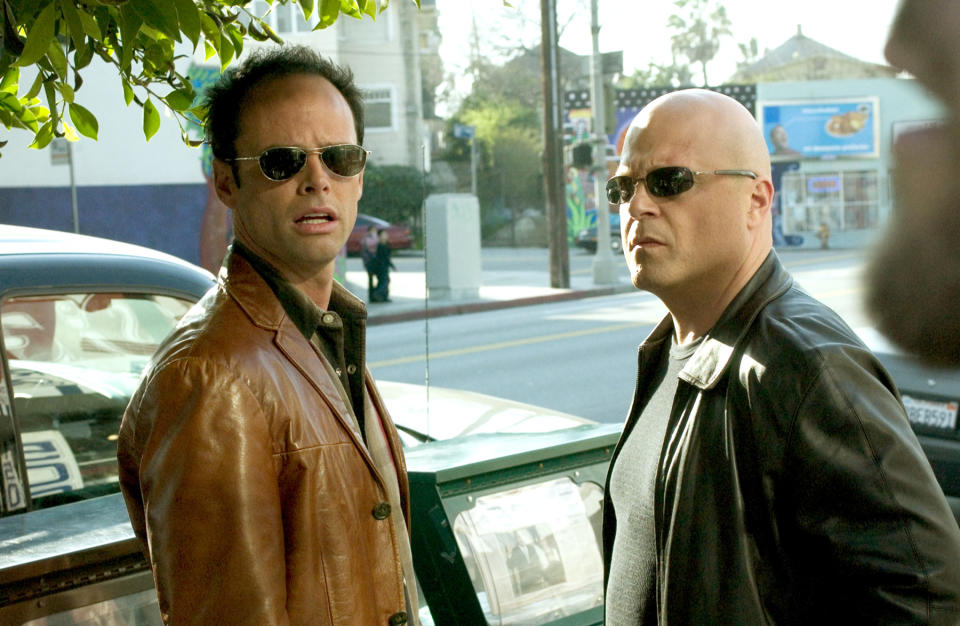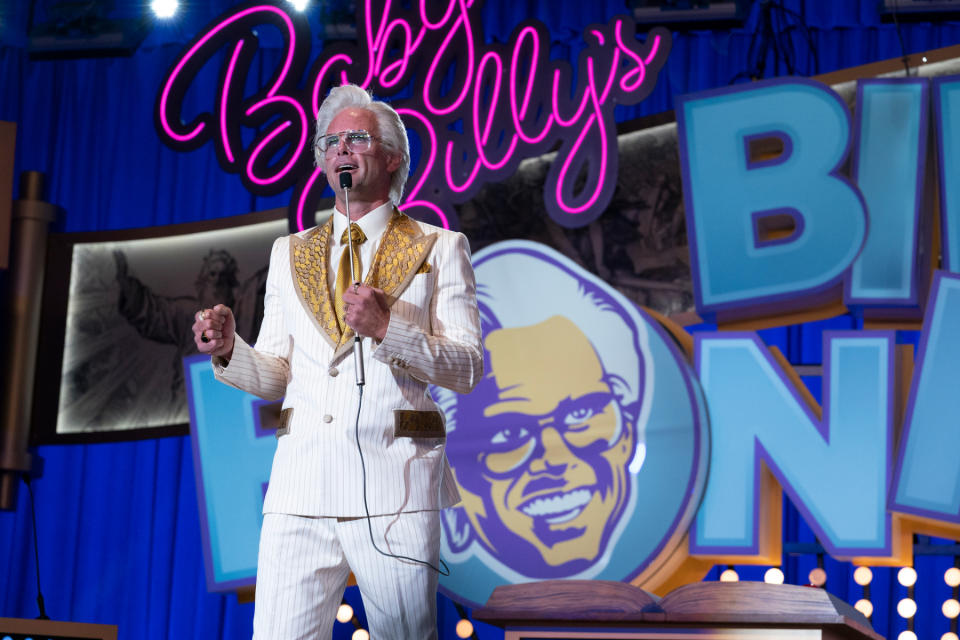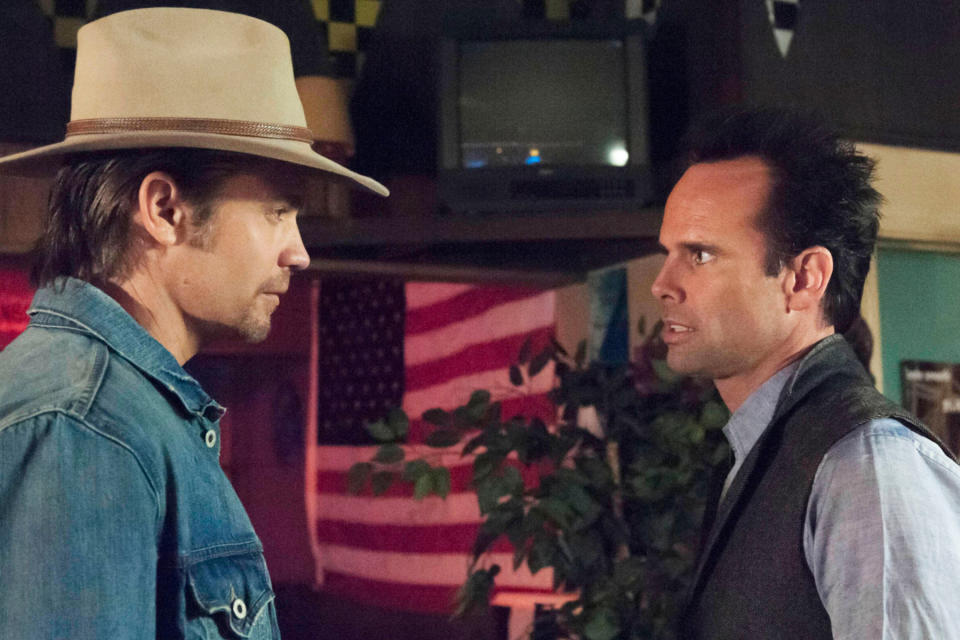‘I Don’t Look for Roles So That I Can Ham It Up’: A Conversation With Walton Goggins
- Oops!Something went wrong.Please try again later.
- Oops!Something went wrong.Please try again later.
- Oops!Something went wrong.Please try again later.
- Oops!Something went wrong.Please try again later.
- Oops!Something went wrong.Please try again later.
- Oops!Something went wrong.Please try again later.

Over the course of an acting career that began when he was a teenager fresh out of Georgia, Walton Goggins has played crooked cops (The Shield), racist gunslingers in Quentin Tarantino movies (Django Unchained and The Hateful Eight), villains in both traditional superhero projects (Ant-Man and the Wasp) and off-kilter ones (I’m A Virgo), and even an elderly televangelist con man called Baby Billy on HBO’s The Righteous Gemstones. Now, he has a dual role in Amazon’s big-budget drama series adaptation of the video game franchise Fallout, which premieres April 11, playing both the 200-year-old mutant killer the Ghoul, and the decent man he once was, B-movie Western star Cooper Howard.
Goggins is different in most ways from these people he embodies. But he and they tend to share one crucial trait: They can talk. A lot. His signature character, hillbilly gangster Boyd Crowder on Justified, was once praised for “using 40 words where four will do.”
More from Rolling Stone
Amazon's Big Spring Sale Ends Tonight: Here's Everything Still Worth Buying
Here Are the Best Amazon Spring Sale Beauty Deals to Shop Right Now
Goggins, who will also appear in the third season of The White Lotus, spoke with Rolling Stone about Fallout, playing Boyd again in last summer’s Justified: City Primeval miniseries, and more.
When we meet the Ghoul, he says, “Well, well, well. Why, is this an Amish production of The Count of Monte Cristo, or the weirdest circle jerk I’ve ever been invited to?” I can’t imagine anyone else delivering that line.
I’ll take that as a compliment.
When did you realize that your gift with colorful dialogue was a reason people wanted to hire you?
I don’t know what came first, the chicken or the egg. I never really think about flourishing dialogue. I just think about the quality of dialogue I’ve gotten to say. Quentin was a fan of Boyd Crowder’s loquacious diatribes or hyperboles. But I’d love to ask other people that have hired me, “What is it about the way that I say the things that I say that made you want to write the things that you write for me?” There’s not an actor worth their weight in salt that doesn’t find humanity in the things that are coming out of their mouth, and a life that is so much more rich than the words that they’re speaking. Or why do it? I’ve gotten a reputation for maybe making sense out of taking 10 minutes to say something that you could have said in 30 seconds, and this is no different.

What appealed to you about playing these Fallout characters?
The Ghoul is very, very different from Cooper Howard. He’s much more reserved. And that was a bit challenging for me to find both of them. Because you don’t really understand one unless you understand the other. The Ghoul is a rascal, really. He’s got a great sense of humor, but underneath that is a lot of pain. He’s seen a lot and felt a lot and all the rest of it. And Cooper’s a kind, patient, caring product of the Greatest Generation. He’s about the best this country has to offer.
There’s a rascally element to a number of the roles that you’ve played. Are you yourself rascally by nature?
I have the propensity, yeah, but the swagger that I have comes in spurts. For every hour of energy that I spend lighting up a room, or trying to engage people, I need two or three hours to myself. I’m an introverted extrovert or an extroverted introvert — I suppose that’s really my nature. But yeah, I think I like to get in a little trouble.
Are you a gamer?
No. My son is. He’s 13 years old. When we started talking about this job, he was 11, and I wasn’t familiar with Fallout, but he was. And we talked at length about it. But I was in really without even understanding what it was I was committing to, because Jonathan Nolan …I think we got on a Zoom and I just said, “Hey, before you guys even start talking, I’m in.” And they said, “Are you sure about that? Do you know what you’re playing?” I said, “It doesn’t matter. I’m in.” He said, “Well, you’ve been alive for 200 years in a post-apocalyptic world. You want to think about it?”
All that being said, I Googled “Fallout Bethesda Games” and read the first article that I came to and got two lines into the origin of the story. And then I just stopped. I closed the computer and thought, “There’s nothing to be gained here for me.” There will be enough people in that room that will protect the integrity of this game and the people that watch it that are players of this game. My job is to look at this with fresh eyes and to be critical of this material without carrying the burden of holding up the mythical kind of nature of Fallout as a game.
When you first came to L.A. as a teenager, what kind of roles were you being considered for?
[Laughs] What do you think? Redneck Number One. If not that, just some nefarious kind of villain, or the goofy sheriff’s deputy. Everybody’s just trying to get into a box that they can get out of when they first start this business, and I was grateful to be given a box right out of the gate. That kept going in that fashion until maybe The Shield. I suppose The Shield was another big turning point for me.
I can’t imagine a show making that many episodes today, where you would get to follow a character like Shane along that much of a journey, from the first episode to what he does in the finale. They gave you a real workout on that job.
Nobody finished that left that show unscathed emotionally on some level.
Tell me about that. The first time I visited the set, I saw how easily Michael Chiklis was able to turn the character off between takes and turn him back on right when it was time to film. But what was the emotional weight like for you?
It was the subject matter. The walls just kept closing in as the seasons progressed and everybody would have their time up at bat, and it would be their moment — or a crucible that they had to go through — and you would see them affected by it. How could you not be affected by it mentally and physically, if you give it your all? Michael is someone that is able to just kind of fly in the clouds and then dip down into it as he needs. I don’t work that way; that’s really not my process. Jay Karnes was good at that, too, and [CCH Pounder] is a master. But I think for most of us, we would begin the season with all of this excitement and whenever we read a script, we would scream and celebrate with so much energy. And by the end of whatever season we were doing, we were just as excited about reading the final episode of that season, but could only muster like, “Yeah, great. That’s great.” There’s really nothing left in the tank because we left it all on the field.

How did you feel at the end of that job, and after such a tragic end for your character?
Lonely. Anger. Confusion. The end of an era, the loss of a job, the loss of friendships, the loss of a routine. I didn’t know what life would be like on the other side of it. And the fall can be precipitous for those that have never experienced it and don’t know how to calibrate their personal life on the other side of it. In some ways, I think people should teach a class on that: “This is how you start over.” I would sign up for that class.
You did [the CBS sitcom] The Unicorn for a couple of years, and have played some other characters who are relatively straightforward. But for the most part in your career, you take on these roles that are in one way or another, somewhat outsized and colorful. Is that something you’re doing by choice?
I don’t know. I don’t think Them That Follow is that, I don’t think Dreaming Wild is that. I think there are [a handful of] roles that really, really stood out. I don’t seek out those roles. I don’t look for roles [so] that I can ham it up. It is a world that I fit in that has gotten a lot of attention. A lot of the things that I’ve done that have been very well respected haven’t been as successful. It is what it is. Maybe I’ve trying to go back and forth. I did this thing called Six that was pretty fucking great. I think my work was wonderful and it was very subtle and very real, and it was a hit for a lot of people, not critically or anything like that.
So if someone were to ask you, for example, if you wanted to play a more straightforward superhero part than the guy from I’m a Virgo, would you be interested in that? And do you think you would be good at that?
I think I would be great at that if the writing was good. I haven’t had the opportunities in big films to do a lot of the things that I’ve wanted to do, but I’ve got to do everything in shows. I did this thing called Deep State, it’s fucking amazing and I’m fucking amazing in it. It’s straight right down the pocket, and if you watch it from beginning to end, it’ll break your fucking heart. What I haven’t been able to do in big tentpole movies, I’ve had the opportunity to do [elsewhere] in my own career, in things some people have seen and things that other people haven’t. And people like different things that I do for different reasons. I don’t know. I don’t spend much time thinking about it, to be quite honest with you.
As the Ghoul, they remove your nose digitally, but the rest of it is makeup. What’s it like to act with all of that on your face?
Once we really started discussing who this person was and what he should look like, I knew it was going to be an intense process. And the first time we applied the makeup, it took five hours in the chair. It was five hours, Alan. Did I say it was five hours, Alan? It was five hours.
How many hours was it?
It was five.
But we learned a lot. And once we got everything on, I asked to keep it on for about an hour and a half. I just sat outside with it and moved around on my own. Then I took my phone and just really looked at who this person is and how this person feels. Jonah [Nolan] obviously had more to say about it than anyone else, but he did invite me to collaborate in conjunction with Vincent Van Dyke, the guy who did the piece, one of the best in the business. And a dear friend of mine who was going to be putting it on, Jake Garber, who’s one of the best special effects makeup guys in the business. And for all of us, the thing that we kept coming back to is we want it to feel like me. I have to be able to see movement in my face. The most important thing that we all said is we don’t want the audience to want to look away when he’s on screen. We want them to be curious enough, and for him to be quasi-handsome enough, to lean in and look at really what’s going on with him, and give this roadmap of his experience in the wasteland. What is the nick in his ear and what is this on the head? What does this mean here? And all the rest of it when he takes his hat off. It was really about bringing the audience into his experience and not having the audience find him repulsive.
I’m claustrophobic by nature, and the idea of being in this thing fucking freaked me out. I couldn’t really process it. But by the time we were filming and we started going, we’d gotten the process down to an hour and 55 minutes, something like that, and we were off to the races. The biggest decision that we made last minute was Jonathan really wanted me to wear contacts because that was more in line with the game. I put them in and we all immediately said, “No, no, it’s the eyes.” That’s the way in which he communicates.

How much time on average are you in makeup to be Baby Billy?
When we first started …I’m going to say that took a couple of hours. Because we really wanted to understand, “Okay, how much time do we have? What does this really, really look like? What can we get away with?” And I can’t put on prosthetics to become this guy. It has to be within my frame and people have to go along with it on some level. But it was two hours, and now we have it down to about 50 minutes, something like that.
Have you talked with [Jody Hill and Danny McBride] about why they wanted you to play this much, much older character?
I think it was somewhere on the press tour for Vice Principals. Danny told me that he had this in his head, and he wanted me to play the 70-year-old man. And I said, “If it comes from your head, yeah, I want to live inside your head forever. If I have a little bitty apartment inside your brain, yes. And if the rent is something I can afford, I’ll do whatever comes out of it.”
What’s it like to play him?
It’s exhausting. He is exhausting. He’s a wild ride. But it’s a lot of fun. We laugh a lot and I have a great time doing it. At the end of the day, my fucking shoulder hurts walking the way that he walks, however he does his thing. I can’t even do it on my own. If you asked me to do an impersonation of Baby Billy, I wouldn’t even know what he does. When you put the makeup on and the wig, it’s just him.

Did it take much convincing for you to play Boyd again in City Primeval?
We talked about it for about a year, with trepidation about not wanting to mess with something that was so special to everyone involved. But Dave Andron and Michael Dinner are extremely persuasive people, and they told me why they believed in it. And they were absolutely right. It doesn’t add to or take away. It’s just another moment and let’s see what happens. And it was so compelling that I said, “Okay, let’s go for it. Let’s do it.”
Was it easy to get back into character?
No, man. It took me sweating bullets outside of everybody else’s eyes. I walked in a bathroom and looked in the mirror and said, “What the fuck are you doing here? What are you doing, Goggins?” And I felt that orange prison jumpsuit and said, “Just come from your truth, man, and walk in and let it rip, however it goes.”
Would you want to play him again if they make another miniseries?
Absolutely, when we’re all positioned. We all feel the same way about it, and we’ve let that be known. So we will see what happens if the stars align and the fates conspire.
Best of Rolling Stone

